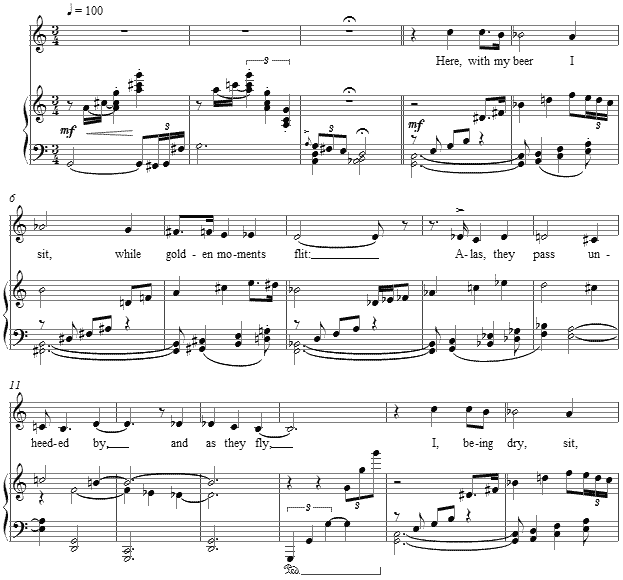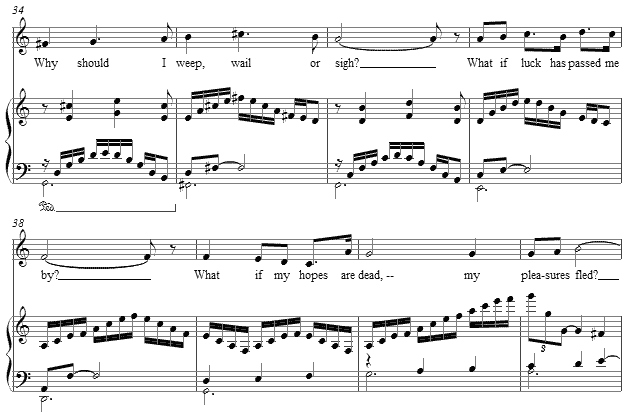Music and Texts of GARY BACHLUND
Vocal Music | Piano | Organ | Chamber Music | Orchestral | Articles and Commentary | Poems and Stories | Miscellany | FAQs
Beer - (2008)
George Arnold
for medium voice and piano
Here,
With my beer
I sit,
While golden moments flit:
Alas!
They pass
Unheeded by:
And, as they fly,
I,
Being dry,
Sit, idly sipping here
My beer.
O, finer far
Than fame, or riches, are
The graceful smoke-wreathes of this cigar!
Why
Should I
Weep, wail, or sigh?
What if luck has passed me by?
What if my hopes are dead,--
My pleasures fled?
Have I not still
My fill
Of right good cheer,--
Cigars and beer
Go, whining youth,
Forsooth!
Go, weep and wail,
Sigh and grow pale,
Weave melancholy rhymes
On the old times,
Whose joys like shadowy ghosts appear,
But leave me to my beer!
Gold is dross,--
Love is loss,--
So, if I gulp my sorrows down,
Or see them drown
In foamy draughts of old nut-brown,
Then do wear the crown,
Without the cross![ 5 pages, circa 3' 15" ]
George Arnold
George Arnold (1834-1865) was a poet, journalist and essayist. After briefly attempting a career as a portrait painter, he turned to writing. Writing under pseudonyms like Graham Allen, George Garrulous, Pierrot, Chevalier M'Arone and McArone [after his middle name]. It was a McArone, his most successful personage, he wrote for The Saturday Press, and for a series in Vanity Fair in 1860 and continued in the Leader and Weekly Review, with a large output of poems, stories, essays, satires, and editorials in the major literary venues of his day, also including Harper's and The Atlantic Monthly. He also published poetry and books on children's games. A contemporary of Walt Whitman, Arnold was likewise a patron of the well known Pfaff's beer cellar, and became involved in legendary episodes with other patrons, many of them artists and authors.
Artist Elihu Vedder remembered George Arnold: "I can recall his gentle, sad smile yet. Gentleness was his great charm. We both lived near Pfaff's, and it was there he read me his poem, shortly after it was written-- 'Here I sit drinking my beer.' He died young; I do not know of what he died, but he seemed to be worn out even when I first met him... He thought his life a wasted life; it was with him a gorgeous romance of youthful despair; but into that grave went a tender charm, great talent, and great weakness."
Written for medium range, the tessitura should be available to most singers but it is intended for those who take the subject of beer seriously. The downward trajectory of the harmonic palette and its chromatic deviance within a single chord structure are intended to indicate the perceived burdens of the artist's life.
Yet at the moment of possible despair, "beer" calls the poet away, as the accompaniment becomes lightly rhapsodic. The answer to the poet's several questions are answered in a few succinct words -- beer, and of course cigars. For these angels appearing in the man's material world, the song setting ends in a clear and uplifting C major, gently and with a repose in answer to the convoluted early chromaticism.
The score for Beer is available as a free PDF download, though any major commercial performance or recording of the work is prohibited without prior arrangement with the composer. Click on the graphic below for this piano-vocal score.


